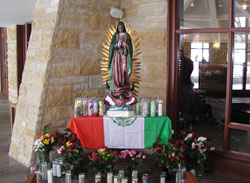2010 Evangelization Supplement
Making connections, understanding are key to evangelizing Hispanics

A shrine to Our Lady of Guadalupe stands in the narthex of St. Bartholomew Church in Columbus in December 2005. A task force of parishioners recently studied how the Seymour Deanery parish can better welcome Hispanic immigrants who have recently moved to Columbus. (File photo by Sean Gallagher)
By Sean Gallagher
Las Jornadas is a Catholic lay movement in the Archdiocese of Indianapolis that helps Hispanic youths and young adults evangelize their peers.
But how can people who do not speak Spanish help welcome recent Hispanic immigrants to central and southern Indiana into the Church here?
The language barrier can be a looming challenge, but it is not insurmountable, said Margarita Solis Deal, archdiocesan coordinator of Hispanic ministry.
“It all starts with relationships with people,” she said. “There are opportunities everywhere to connect. That ministry is being done at the grassroots level.”
Solis Deal said making that connection can happen when non-Hispanics come to understand the troubles many immigrant Catholics from Mexico or Central or South America face when moving to the United States.
“The priority [now] is to give them support,” she said. “They have to work two jobs. They have to put food on the table. They don’t know if they’ll have a job tomorrow. Their work isn’t to learn English and to communicate better with their English-speaking brothers and sisters.
“Understand the plight of the immigrant so that they can be better in terms of connecting. Welcome them into the Church. If they’re not welcomed into the Church, they’re going to leave.”
Solis Deal warned against the danger of simply stereotyping Hispanic Catholics.
“If people can kind of step out of themselves to look beyond the Hispanic title and [see] that this is their brother and sister in our Catholic faith, it helps a little bit,” she said. “Once we put those labels on, however, forget it.”
Matthew Souza, 53, a member of St. Bartholomew Parish in Columbus, is taking Solis Deal’s advice to heart by helping his parish find ways to be more welcoming to the growing Hispanic population in Bartholomew County.
His interest in reaching out to Hispanic Catholics is, in part, rooted in the story of his family.
The son of a Guatemalan immigrant father and a mother from Missouri, Souza lived for four years as a youth in Mexico City when his father worked there for the Columbus-based Cummins engine company.
Souza, who led a task force at St. Bartholomew Parish to address the parish’s growing Hispanic population, has also been moved by the way in which his four children have a growing interaction with their Hispanic peers at St. Bartholomew School and Columbus North High School.
Ultimately, however, Souza wants to make the Hispanic Catholics who have moved to Columbus feel welcome because he believes that is what Jesus would do.
“That’s the type of behavior that he would have exhibited,” Souza said. “That’s the core motivation.”
The task force, which interviewed more than 35 parishioners representative of the entire faith community, recently made three recommendations to St. Bartholomew’s pastoral council.
One was to find a replacement for Franciscan Father Tom Fox, who has helped lead Hispanic ministry at St. Bartholomew Parish for many years, but is retiring this summer. St. Bartholomew’s pastor, Father Clement Davis, is currently taking Spanish lessons and starting to say, on occasion, parts of the Mass in Spanish.
Another recommendation was to find a way to have a full-time parish staff position for someone who speaks Spanish in order “to help newly arrived Spanish-speaking members to have their needs met in a language they can understand.”
The third recommendation was based on the task force’s observation that the parish is already doing many good things to welcome Hispanic Catholics. Souza said that the parish doesn’t need to make huge changes in this regard.
“We don’t need to worry about too much big, huge, boil the ocean changes,” he said. “The change is already happening. We just need to be prepared to do whatever it takes to make the change welcome.”
At the start of the work that the task force performed, Souza had an interest in Hispanic ministry. Now he is passionate about it.
“I deeply, totally believe that Christ’s message to us is love,” Souza said. “To me, [Hispanic ministry] is a way that a community can express that, by opening its arms and warmly embracing, with love and through faith, the people who are newly arrived in the community, regardless of their skills, regardless of their past, regardless of their language.” †
